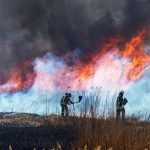
Wildfire smoke could interfere with the safety of surgeries, a new study warns. Inhaling the smoke could complicate the effects of anesthesia on surgical patients, and it also might hamper their recovery, researchers reported Aug. 6 in the journal Anesthesiology. “Wildfire smoke poses significant health risks, particularly in people with preexisting heart and lung disease, obese patients, infants and young children, and other vulnerable groups,” said senior researcher Dr. Vijay Krishnamoorthy, chief of critical care medicine at Duke University School of Medicine in Durham, N.C. “At a time of rising global exposure, anesthesiologists need to be equipped to manage the potential adverse effects of wildfire smoke exposure” on patient outcomes, Krishnamoorthy added in a journal news release. Nearly 100 wildfires are currently raging across the United States, burning more than 2 million acres, researchers noted. Wildfire smoke contains a complex mix of fine particles and chemicals that, when inhaled, enter the circulatory system. Organs like the heart and lungs can be damaged as a result, researchers said. The inhaled particles produce inflammation, damage the lining of blood vessels and cause clotting abnormalities in smaller blood vessels, they added. Exposure to such particle pollution also increases the risk of heart attack, heart rhythm problems, heart failure and stroke, they noted. All these factors lead to increased rates of complications among patients undergoing surgery, the researchers concluded.… read on > read on >


















